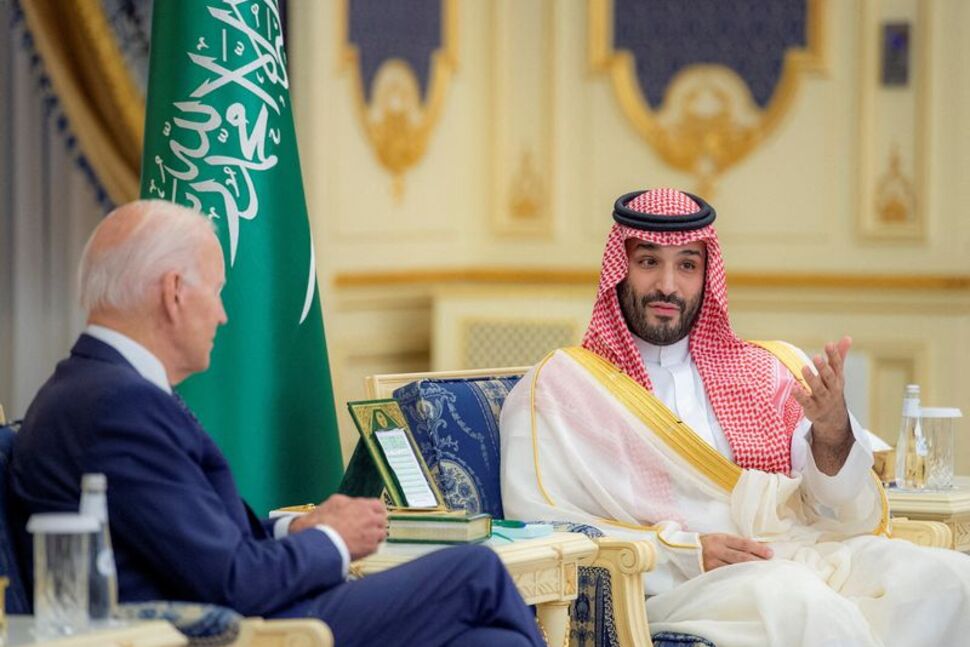(S&P Global Platts) Saudi officials said on July 16 that the country’s oil production policies are implemented within the OPEC+ group as US President Joe Biden ended his four-day trip to the Middle East without a pledge for higher crude supply to further temper oil prices.
Biden, who concluded on July 16 his first visit to Saudi Arabia as US president, joined officials from six countries of the Gulf Cooperation Council and Iraq, Jordan and Egypt in a summit in the port city of Jeddah on the last day of his trip, where he affirmed his commitment to the region.
Saudi foreign minister Faisal bin Farhan said oil was not discussed during the summit, whose joint statement praised OPEC+ efforts to stabilize the global oil markets and Saudi Arabia’s leading role “in achieving consensus between the members of OPEC+.”
“We listen to all statements from our friends and partners around the world, in particular consumers…but at the end of the day OPEC+ has an existing system to monitor the markets and guarantee supply according to energy market needs,” bin Farhan said at a press conference after the end of the summit.
“Our opinion up to now is that this system is effective and is working as needed.”
Good discussion
Bin Farhan’s statements follow Biden’s assurance on July 15 after a meeting with Saudi leaders that “further steps” will be taken to increase supply.
“We had a good discussion on ensuring global energy security and adequate oil supplies to support global economic growth, and that will begin shortly,” Biden said. “I’m doing all I can to increase supply from the United States of America, and the Saudis shared that urgency.
“Based on our discussions today, I expect we’ll see further steps in the coming weeks,” he added.
Faced with high inflation of 9.1% and record gasoline prices, Biden is eager to see higher supplies from OPEC+ to boost his low ranking in polls, particularly ahead of key midterms elections in November.
OPEC+ ministers are due to meet on Aug. 3 to decide on a course of action for September and beyond after affirming at a June 30 meeting the total unwinding of their historic 9.7 million b/d cut that was agreed in May 2020 at the beginning of the pandemic.
Saudi investment minister promises ‘strong capabilities and assets’ in Guyana partnership
The current OPEC+ agreement holds the group’s August quotas in place through the end of the year. Saudi Arabia will be obliged to hold its output at 11 million b/d, about 1 million b/d shy of its stated production capacity, while the UAE’s quota will be 3.17 million b/d, about 830,000 b/d below its claimed capacity.
Those two countries are the only OPEC+ members with any significant ability to raise production.
‘Unrealistic policies’
Bin Farhan’s insistence of keeping any oil output decision with OPEC+ decisions was echoed by Saudi Minister of State for Foreign Affairs Adel al-Jubeir in an interview with local newspaper Arab News published July 16.
“Increasing crude oil supplies to the US is not going to alleviate the problem,” Jubeir told the English language daily.
“But going back to the global situation, Saudi Arabia’s policy is to work within OPEC and OPEC+ to make sure the markets are adequately supplied, and we have been doing that.”
For his part, Saudi crown prince Mohamed bin Salman warned that “unrealistic” energy transition policies will lead to higher inflation in the coming years.
World’s 2nd largest oil producer told to invest now in Guyana, or pay more later
“The environmental challenges that the world is facing now, on top of which is climate change…. requires dealing with it realistically and responsibly in order to achieve sustainable growth by adopting a balanced approach through a gradual and responsible transition,” he told the Jeddah summit.
“Adopting unrealistic policies to reduce emissions by excluding main energy sources…will lead in the coming years to unprecedented inflation and an increase in energy prices.”
The crown prince also emphasized the need for investments in hydrocarbons, which are still needed and should complement efforts to reduce emissions.
‘Zero-sum game’
Biden’s trip to the region was marketed as a step toward improving ties with leaders in the Middle East, which have become frayed over the years due to US disengagement.
Biden was quick to assure leaders at the Jeddah summit that the “US is not going anywhere.”
Biden said: “The US is going to remain an active and engaged partner in the Middle East.”
“We will not walk away and leave a vacuum to be fill filled by China, Russia or Iran.”
Biden’s comments about the close relationship that has developed between the Middle East and countries such as a Russia received a response from bin Farhan. Saudi officials have maintained that Russia is a key partner, particularly as it is the leading non-OPEC ally in the OPEC+ group.
“It’s important to understand that the region has matured and that means the region has developed strategic relationships with a number of partners. The US remains our main strategic partner,” Bin Farhan said at the press conference.
“But that does not mean we are not able to also have strong partnerships and relationships with others around the world. I do not see it as a zero-sum game.”



